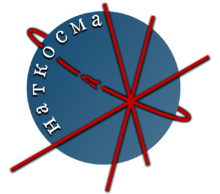Natkosma: Difference between revisions
No edit summary |
No edit summary |
||
| Line 3: | Line 3: | ||
|native_name = Національне космологічне агентство<br>Natsionalʹne kosmolohichne ahent·stvo | |native_name = Національне космологічне агентство<br>Natsionalʹne kosmolohichne ahent·stvo | ||
|owner = | |owner = | ||
|headquarters = 7 Olsovskyy Prospekt, [[Samistopol]], [[ | |headquarters = 7 Olsovskyy Prospekt, [[Samistopol]], [[Soravia]] | ||
|spaceport = [[Minilov|Kamenka Cosmodrome]], [[Minilov|Bashanta]], [[Minilov]] (until 1978)<br>[[Viktor V. Matvyenko Cosmodrome]], [[Provinces of | |spaceport = [[Minilov|Kamenka Cosmodrome]], [[Minilov|Bashanta]], [[Minilov]] (until 1978)<br>[[Viktor V. Matvyenko Cosmodrome]], [[Provinces of Soravia|Terekhivka]], [[Soravia]] | ||
|seal = | |seal = | ||
|seal_size = | |seal_size = | ||
| Line 14: | Line 14: | ||
|administrator = Vsevolod Kharchenko | |administrator = Vsevolod Kharchenko | ||
|budget = {{profit}} $841 million <small>(2019)</small> | |budget = {{profit}} $841 million <small>(2019)</small> | ||
|language = {{wp|Rusyn language| | |language = {{wp|Rusyn language|Soravian}} | ||
|URL = www.natkosma.nr | |URL = www.natkosma.nr | ||
}} | }} | ||
The '''National Cosmological Agency''' ({{wp|Rusyn language| | The '''National Cosmological Agency''' ({{wp|Rusyn language|Soravian}}: Національне космологічне агентство, ''Natsionalʹne kosmolohichne ahent·stvo'' (HKA)), often referred to by its abbreviated form '''Natkosma''' ('''Нац'''іональне '''косм'''ологічне '''а'''гентство, '''''Nats'''ionalʹne '''kosm'''olohichne '''a'''hent·stvo'') is the primary space agency of the [[Soravia|Soravian Republic]]. Nominally private, the agency's shares are held predominantly by the government, and is tasked with conducting civilian space research, space exploration and scientific endeavours. | ||
Established in 1961 as one of the world's first space agencies, Natkosma was originally based at the Kamenka Cosmodrome on the shores of Lake Min in [[Minilov]], and participated in the cooperative moon landings with [[Swetania]] and the [[Euclean Community]] in the late 1960s, when [[Viktor Matvyenko]] became the first | Established in 1961 as one of the world's first space agencies, Natkosma was originally based at the Kamenka Cosmodrome on the shores of Lake Min in [[Minilov]], and participated in the cooperative moon landings with [[Swetania]] and the [[Euclean Community]] in the late 1960s, when [[Viktor Matvyenko]] became the first Soravian man on the moon. Conducting mainly scientific missions throughout the 1970s, Natkosma was suspended in 1978 following the outbreak of the [[Sostava War]] and was reinstated in 1985 by [[Vasil Bodnar]] at the newly-built spaceport at the Viktor V. Matvyenko Cosmodrome. In the modern day, it is almost exclusively tasked with civilian space research and the maintainance of MSSN, Soravia's {{wp|satellite navigation}} network, established in 1989. It continues to work heavily in conjunction with other space programs across [[Euclea]]. | ||
== Name and logo == | == Name and logo == | ||
| Line 30: | Line 30: | ||
== Future operations == | == Future operations == | ||
[[Category:Science in | [[Category:Science in Soravia]] | ||
Revision as of 23:54, 6 November 2020
This article is incomplete because it is pending further input from participants, or it is a work-in-progress by one author. Please comment on this article's talk page to share your input, comments and questions. Note: To contribute to this article, you may need to seek help from the author(s) of this page. |
Національне космологічне агентство Natsionalʹne kosmolohichne ahent·stvo | |
 Surveying the cosmos | |
| Abbreviation | Natkosma |
|---|---|
| Formation | 22 April 1961 |
| Headquarters | 7 Olsovskyy Prospekt, Samistopol, Soravia |
Official language | Soravian |
Administrator | Vsevolod Kharchenko |
| Kamenka Cosmodrome, Bashanta, Minilov (until 1978) Viktor V. Matvyenko Cosmodrome, Terekhivka, Soravia | |
Budget | |
| Website | www.natkosma.nr |
The National Cosmological Agency (Soravian: Національне космологічне агентство, Natsionalʹne kosmolohichne ahent·stvo (HKA)), often referred to by its abbreviated form Natkosma (Національне космологічне агентство, Natsionalʹne kosmolohichne ahent·stvo) is the primary space agency of the Soravian Republic. Nominally private, the agency's shares are held predominantly by the government, and is tasked with conducting civilian space research, space exploration and scientific endeavours.
Established in 1961 as one of the world's first space agencies, Natkosma was originally based at the Kamenka Cosmodrome on the shores of Lake Min in Minilov, and participated in the cooperative moon landings with Swetania and the Euclean Community in the late 1960s, when Viktor Matvyenko became the first Soravian man on the moon. Conducting mainly scientific missions throughout the 1970s, Natkosma was suspended in 1978 following the outbreak of the Sostava War and was reinstated in 1985 by Vasil Bodnar at the newly-built spaceport at the Viktor V. Matvyenko Cosmodrome. In the modern day, it is almost exclusively tasked with civilian space research and the maintainance of MSSN, Soravia's satellite navigation network, established in 1989. It continues to work heavily in conjunction with other space programs across Euclea.